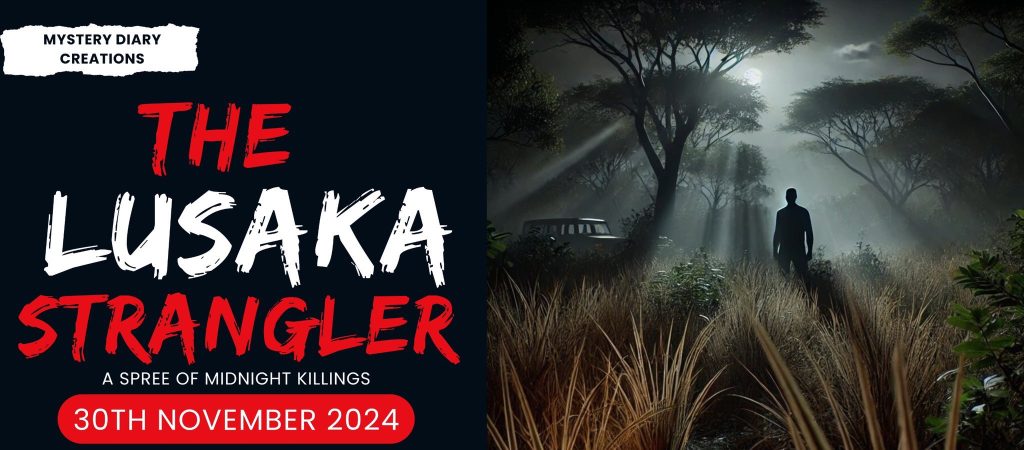
Unveiling the chilling true story of the Lusaka Strangler, a dark chapter in Zambia’s history comes to life on stage.
On November 30, 2024, Zambians will witness one of their most haunting historical cases dramatized on stage as the Lusaka Play House premieres The Lusaka Strangler play. This production unearths the story of a serial killer who terrorized Lusaka in the 1980s, leaving a lasting mark on the nation’s collective psyche. The play isn’t just a recount of past horrors—it’s a deep dive into fear, trauma, and resilience.
In an exclusive interview with My Afrika Magazine journalist Tapiwanashe Rubaya (TR), producer Teddy Likando (TL), a professional lawyer and seasoned thespian, shares insights on the play and the tragic period that traumatized not only Lusaka but the entire nation.
A Play Rooted in History: The storyline reflects real events that shook Lusaka when a series of brutal killings left the city in a state of panic, claiming the lives of 30 documented women and likely more. With the Lusaka Strangler evading authorities, the demand for justice grew urgent. The production compels audiences to confront a period many would prefer to forget, reflecting on the weight of societal vulnerabilities.
TR: Can you introduce yourself to our readers and share a bit of your background?
TL: My name is Teddy Likando. I’m a lawyer and a passionate thespian dedicated to producing work that provokes thought and encourages social reflection. I’m the producer of The Lusaka Strangler play, written by the incredible Justin Tembo, premiering at the Lusaka Play House on November 30.
TR: Why did you decide to bring this story to the stage?
TL: The story of the Lusaka Strangler goes beyond tragedy—it highlights the fragility of social systems meant to protect citizens, especially women. Our aim is not only to recount past events but also to address the societal issues that allowed such horrors to unfold. Theater can spark strong emotions and insights, and we hope audiences leave with a renewed commitment to combating gender-based violence.
TR: How were women impacted in Zambia after the Strangler’s reign in the 1980s?
TL: Women faced extreme anxiety and limitations on their freedom, often feeling unsupported by security systems. While progress has been made in recognizing gender-based violence, there’s still much work to be done. Safety and women’s rights require ongoing advocacy, and this play contributes to that conversation.
TR: What challenges did you face adapting this historical story for theater?
TL: Capturing such a traumatic period authentically while honoring the victims’ experiences required deep research, sensitivity, and collaboration. Balancing factual storytelling with respectful creativity presented hurdles, as did securing funding for a story with limited prior exposure. Thankfully, our team’s passion helped us overcome these challenges.
TR: What was the public reaction to announcing the play?
TL: Responses have varied. Many people see the importance of telling this story, while others remain understandably cautious due to its sensitive nature. Overall, there’s a strong sentiment that this story needs to be told to foster dialogue and understanding.
TR: Have you connected with the victims’ families or the police?
TL: Documentation from the 1980s is sparse, making it challenging to reach families. We’ve engaged institutions like the Lusaka National Museum and the Police Service for insights. They have been invaluable in helping us present an accurate portrayal.
TR: Has the Zambian government revisited issues exposed by the Strangler case?
TL: Efforts have been made to improve policing and address gender-based violence, but the journey continues. This play reminds us that ongoing commitment is essential to protect vulnerable populations and address lingering issues.
TR: You’re debuting this during the 16 Days of Activism against Gender-Based Violence. Was that intentional?
TL: Absolutely. Staging the play during this period amplifies our message, reinforcing the call for awareness and action on gender-based violence.
TR: Do you plan to tour this production in other countries?
TL: Yes, we’re exploring options to bring the show to Zimbabwe, South Africa, and beyond. These issues resonate across borders, and we aim to contribute to a wider conversation about justice and safety for all.
TR: Who are the actors and key production members?
TL: Our cast includes talented Zambian actors like Nelly Nyangu, Fackson Mwaanza, and Henry Simbeye. The production team, including Justin Sinkala and others, has worked tirelessly to bring this impactful story to life.
The Lusaka Strangler not only recounts a tragic chapter in Zambian history but also serves as a call to action for a safer future, challenging audiences to reflect on the systems we rely on to protect our communities.



